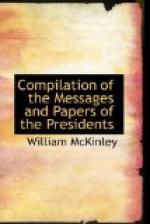Though the powers of the military occupant are absolute and supreme and immediately operate upon the political condition of the inhabitants, the municipal laws of the conquered territory, such as affect private rights of person and property and provide for the punishment of crime, are considered as continuing in force, so far as they are compatible with the new order of things, until they are suspended or superseded by the occupying belligerent; and in practice they are not usually abrogated, but are allowed to remain in force and to be administered by the ordinary tribunals substantially as they were before the occupation. This enlightened practice is, so far as possible, to be adhered to on the present occasion. The judges and the other officials connected with the administration of justice may, if they accept the supremacy of the United States, continue to administer the ordinary law of the land as between man and man under the supervision of the American commander in chief. The native constabulary will, so far as may be practicable, be preserved. The freedom of the people to pursue their accustomed occupations will be abridged only when it may be necessary to do so.
While the rule of conduct of the American commander in chief will be such as has just been defined, it will be his duty to adopt measures of a different kind if, unfortunately, the course of the people should render such measures indispensable to the maintenance of law and order. He will then possess the power to replace or expel the native officials in part or altogether, to substitute new courts of his own constitution for those that now exist, or to create such new or supplementary tribunals as may be necessary. In the exercise of these high powers the commander must be guided by his judgment and his experience and a high sense of justice.
One of the most important and most practical problems with which it will be necessary to deal is that of the treatment of property and the collection and administration of the revenues. It is conceded that all public funds and securities belonging to the government of the country in its own right and all arms and supplies and other movable property of such government may be seized by the military occupant and converted to his own use. The real property of the state he may hold and administer, at the same time enjoying the revenues thereof; but he is not to destroy it save in the case of military necessity. All public means of transportation, such as telegraph lines, cables, railways, and boats, belonging to the state may be appropriated to his use, but unless in case of military necessity they are not to be destroyed. All churches and buildings devoted to religious worship and to the arts and sciences, all schoolhouses, are, so far as possible, to be protected, and all destruction or intentional defacement of such places, of historical monuments or archives, or of works of science or art is prohibited save when required by urgent military necessity.




